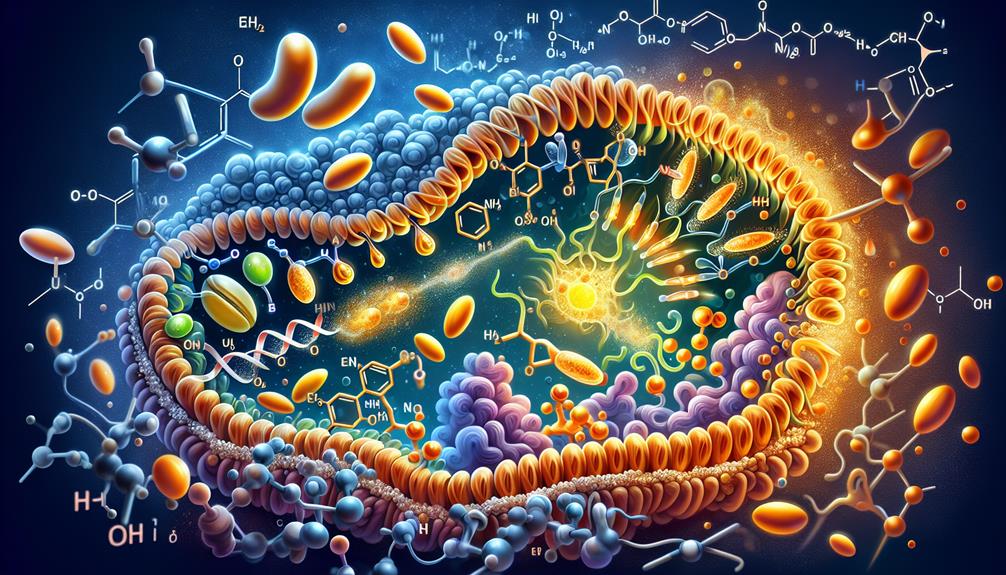






B Vitamins are vital for your energy metabolism. They act as coenzymes in important metabolic processes in your body. These vitamins support the breakdown of carbohydrates, proteins, and fats to produce energy efficiently. Inadequate intake can lead to disruptions in metabolic function. B Vitamins are essential for converting nutrients into usable energy, aiding in exercise performance, and positively impacting athletic abilities. Understanding how B Vitamins work in your body can help you optimize your energy levels and overall health.
Key Takeaways
- Act as coenzymes in metabolic processes, aiding in energy production.
- Assist in converting carbohydrates, fats, and proteins into usable energy.
- Support cellular respiration and ATP synthesis for energy generation.
- Essential for optimal metabolism of nutrients, including carbohydrates, fats, and proteins.
- Play a crucial role in enhancing exercise performance and overall energy metabolism.
Importance of B Vitamins
B Vitamins play an essential role in supporting various metabolic functions in the body. When it comes to energy production, these vitamins are vital for cellular respiration and ATP synthesis. Cellular respiration is the process through which cells convert nutrients into energy in the form of ATP, which is the primary energy currency of the body.
In cellular respiration, B vitamins act as coenzymes that help enzymes carry out chemical reactions necessary for the breakdown of glucose and fatty acids to generate ATP. For instance, B2 (riboflavin) is a component of the electron transport chain, while B3 (niacin) is essential for reactions that produce NADH, a molecule that contributes to ATP synthesis.
Furthermore, B vitamins are involved in the metabolism of carbohydrates, proteins, and fats, ensuring that the body can extract energy from these macronutrients efficiently. Without an adequate intake of B vitamins, these metabolic processes can be disrupted, leading to decreased energy production and overall metabolic function.
B Vitamin Functions
In supporting various metabolic functions in the body, B vitamins play an essential role in ensuring energy production and overall metabolic efficiency. B vitamins, particularly B6, B9 (folate), and B12, are critical for maintaining neurological health. These vitamins are involved in the synthesis of neurotransmitters such as serotonin, dopamine, and gamma-aminobutyric acid (GABA), which are necessary for proper brain function and mood regulation. Adequate levels of B vitamins also support myelin formation, the protective sheath around nerves, aiding in nerve signal transmission.
Moreover, B vitamins are necessary for DNA synthesis, a fundamental process for cell growth, repair, and replication. Specifically, folate and B12 are vital for the production of nucleotides, the building blocks of DNA. Insufficient levels of these vitamins can lead to disruptions in DNA synthesis, potentially affecting cell division and function. Ensuring an adequate intake of B vitamins is crucial for maintaining excellent neurological health and supporting DNA synthesis within the body.
B Vitamins and Carbohydrate Metabolism

Sufficient consumption of B vitamins is essential for ideal carbohydrate metabolism in the body, supporting efficient energy production from carbohydrates. B vitamins play a vital role in converting carbohydrates into glucose, which is then used as fuel for energy during physical activities. In the context of exercise performance, B vitamins are particularly important as they aid in the breakdown of carbohydrates to produce energy, helping athletes meet the demands of intense workouts.
Research suggests that B vitamins can positively impact athletic performance by enhancing the body's ability to utilize carbohydrates effectively. Thiamine (B1), riboflavin (B2), niacin (B3), pantothenic acid (B5), pyridoxine (B6), and biotin (B7) are all essential for carbohydrate metabolism and energy production. Athletes with B vitamin deficiencies may experience decreased energy levels, fatigue, and reduced exercise capacity. Ensuring an adequate intake of B vitamins through a balanced diet or supplementation can support the best carbohydrate metabolism, potentially leading to improved exercise and athletic performance.
B Vitamins and Fat Metabolism
To optimize fat metabolism, incorporating sufficient levels of B vitamins into your diet is essential for supporting the body's efficient breakdown and utilization of fats for energy production. B vitamins play a critical role in converting fats into usable energy, making them indispensable for weight loss and exercise performance.
Research suggests that B vitamins, particularly B2 (riboflavin), B3 (niacin), and B5 (pantothenic acid), are involved in the process of breaking down fats. These vitamins help in the metabolism of fatty acids, enabling the body to use stored fat as a source of energy. Additionally, B vitamins are necessary for the synthesis of carnitine, a compound that plays a key role in the transportation of fatty acids into the mitochondria for energy production.
Studies have shown that adequate levels of B vitamins can enhance exercise performance by improving energy metabolism, reducing fatigue, and supporting muscle function. As such, ensuring sufficient intake of B vitamins through a balanced diet or supplementation may benefit both weight management and physical performance.
B Vitamins and Protein Metabolism

For a comprehensive understanding of how B vitamins contribute to overall metabolic processes, exploring their role in protein metabolism is essential. B vitamins play a pivotal part in protein synthesis, which is fundamental for muscle building and repair. Specifically, vitamins B6, B12, and folate are key players in this process. These vitamins help convert the amino acids from proteins into new proteins, aiding in the growth and maintenance of muscle tissue.
Moreover, B vitamins are involved in energy production from proteins. By assisting in the breakdown of proteins into amino acids, B vitamins contribute to the generation of energy. This energy is essential for various physiological functions, including muscle contractions during exercise and daily activities.
Additionally, B vitamins support nutrient absorption, ensuring that proteins and other essential nutrients are effectively absorbed from the food you consume. This ideal absorption is crucial for overall health and wellbeing, as it provides the body with the necessary building blocks for growth, repair, and maintenance.
B Vitamins and Energy Production
In the domain of energy production, B vitamins play a pivotal role in facilitating metabolic processes essential for your body's vitality and functionality. B vitamins are vital for converting carbohydrates, fats, and proteins into energy that your body can utilize efficiently. This process is crucial for maintaining peak athletic performance as it provides the necessary fuel for your muscles during physical activities.
Moreover, B vitamins are essential for mental alertness. They contribute to the production of neurotransmitters that are vital for cognitive function, concentration, and overall brain health. By supporting the synthesis of these neurotransmitters, B vitamins help enhance mental clarity and focus, ultimately aiding in tasks that require heightened cognitive performance.
Ensuring an adequate intake of B vitamins through a balanced diet or supplementation can significantly impact your energy levels, athletic performance, and mental acuity. Whether you are an athlete aiming for top performance or an individual seeking enhanced mental alertness, incorporating B vitamins into your daily routine can be beneficial for overall vitality and well-being.



